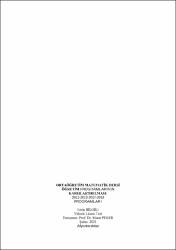| dc.contributor.advisor | Peker, Murat | |
| dc.contributor.author | Bilgili, Emin | |
| dc.date.accessioned | 2021-11-08T10:09:23Z | |
| dc.date.available | 2021-11-08T10:09:23Z | |
| dc.date.issued | 2021 | en_US |
| dc.date.submitted | 2021 | |
| dc.identifier.uri | https://hdl.handle.net/11630/9673 | |
| dc.description.abstract | Bu çalışmanın amacı 2011, 2013, 2017 ve 2018 yıllarında güncellenen ortaöğretim matematik dersi öğretim programları ile 2017 ve 2018 yıllarında hazırlanan ortaöğretim fen lisesi matematik dersi öğretim programlarının genel ve özel amaçlarını; perspektif ve vizyonlarını; yeterlilik, beceri ve yetkinlik alanlarını; temel felsefelerini ve yaklaşımlarını; konu, kazanım ve öğrenme-alt öğrenme alanlarını; ölçme ve değerlendirme yaklaşımlarını karşılaştırarak benzerlik ve farklılıklarını ortaya koymaktır. Çalışma nitel bir araştırmadır. Veriler doküman analizi yöntemiyle elde edilmiş, içerik analizi yöntemiyle çözümlenmiş ve karşılaştırılmıştır. Bulunan sonuçlara göre incelenen programların genel amaçlarının Türk Milli Eğitiminin Genel Amaçları ile paralel olduğu, 2013 programından 2018 programlarına doğru gidildikçe daha özel amaçlardan daha genel amaçlara yer verildiği ve bireylerin tek boyutlu değil çok boyutlu gelişiminin hedeflendiği görülmüştür. 2011-2013 programlarının daha çok matematiksel bilgi, matematiksel problem çözme ve modelleme becerileri üzerine odaklandığı; 2017-2018 programlarının ise sadece matematik yeterliliği üzerine değil, bireye hayatı boyunca sahip olacağı, sosyal hayatında kullanacağı yeterlilik ve yetkinlik alanları üzerine de odaklandığı görülmüştür. Bütün programların öğrenci merkezli, bilginin hazır olarak değil öğrencinin kendi yaşantıları yoluyla yapılandırdığı eğitim süreçlerini içeren bir anlayışa sahip olduğu belirlenmiştir. 2013 yılından itibaren programlarda yaşanan sadeleştirmeler nedeniyle, 2011 programından 2018 programlarına doğru gidildikçe konu ve kazanım sayılarında belirgin azalışlar görülmüştür. Programların ölçme-değerlendirme yaklaşımlarının benzer özellikler içerdiği gözlemlenmiştir. Programların sonuç değerlendirmenin yanında süreç değerlendirmeye vurgu yaptığı, ölçme-değerlendirme sürecinde bireysel farklılıkları dikkate alabilmek için fazla sayıda ölçme aracının kullanılmasını önerdiği, öğrencilerin hem kendilerini hem diğer arkadaşlarını değerlendirmelerine olanak tanınması yönünde görüşlerini öne çıkardığı görülmüştür. | en_US |
| dc.description.abstract | The aim of this study is the general and specific objectives of secondary school mathematics curriculum and the secondary school science high school mathematics curriculum, updated in 2011, 2013, 2017, 2018 and prepared in 2017 and 2018; perspectives and visions; competency, skills and perfection; basic philosophies and approaches; subject, acquisition, learning domains and sub-learning domains; to compare the measurement and evaluation approaches and approaches to reveal their similarities and differences. The study is a qualitative research. Data were obtained by document analysis method; data were analyzed and compared by content analysis method. It is seen that the general objectives of the programs are in line with the objectives of the Turkish National Education. As we consider the programs from 2013 to 2018, it is seen that more specific purposes are included, and that multi-dimensional development of the individual is aimed. While the 2011-2013 programs mostly formed skills on mathematical knowledge, mathematical problem solving and modeling; Programs of 2017-2018 have created areas of competence and competence that will be used not only on mathematics competence, but also in human relationships in the social life that the individual will have throughout his life. All programs are student-centered; it can be said that the knowledge has an understanding including the educational processes that the student constructs through his / her own life; it is not presents as ready. Due to the simplification of the programs since 2013, there is a significant decrease in the number of subjects and achievements as we move from the 2011 program to the 2018 programs. It has been observed that the assessment-evaluation approaches of the programs contain similar features. Programs emphasize process evaluation as well as result evaluation and indicate the use of a large number of measurement tools to take into account individual differences in the assessment-evaluation process. Those programs also state that students should be given chances in order to evaluate both themselves and their other friends. | en_US |
| dc.language.iso | tur | en_US |
| dc.publisher | Afyon Kocatepe Üniversitesi Sosyal Bilimler Enstitüsü | en_US |
| dc.rights | info:eu-repo/semantics/openAccess | en_US |
| dc.subject | Matematik | en_US |
| dc.subject | benzerlik ve farklılık | en_US |
| dc.subject | Ortaöğretim | en_US |
| dc.subject | Öğretim Programı | en_US |
| dc.title | Ortaöğretim matematik dersi öğretim programlarının karşılaştırılması: 2011-2013-2017-2018 programları | en_US |
| dc.title.alternative | Comparison of secondary mathematics course curriculums: 2011-2013-2017-2018 programs | en_US |
| dc.type | masterThesis | en_US |
| dc.department | Enstitüler, Sosyal Bilimler Enstitüsü, Eğitim Bilimleri Ana Bilim Dalı | en_US |
| dc.relation.publicationcategory | Tez | en_US |
| dc.contributor.institutionauthor | Bilgili, Emin | |



















